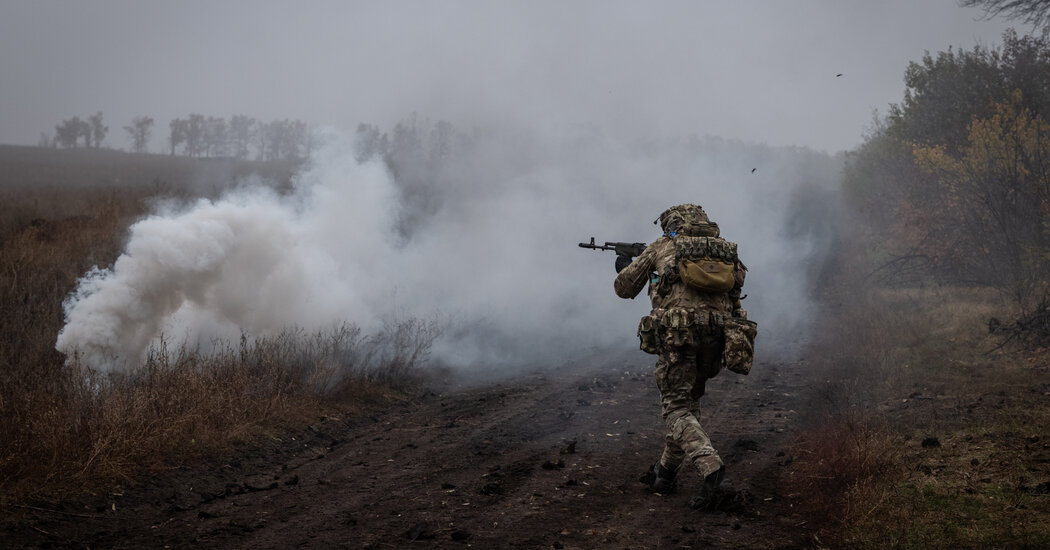The former Prime Minister of Britain, David Cameron, in his new role as foreign secretary, has vowed during a surprise visit to Ukraine that his country will keep providing military support for Kyiv “however long it takes,” seeking to reassure the Ukrainian government amid fears that the ongoing conflict with Russia has been forgotten as much of the world’s attention focuses on the war in Gaza.
The visit was announced on Thursday shortly after Ukrainian President Volodymyr Zelensky warned that his country could not afford a “frozen conflict” with Russia. It is Mr. Cameron’s first working trip abroad since being appointed foreign minister on Monday.
Mr. Zelensky expressed gratitude for the gesture.
“The world is not focused on the situation on our battlefield in Ukraine, and this dividing focus really doesn’t help,” he said during a meeting with Mr. Cameron, according to a video released by the Ukrainian leader on social media. The British foreign minister responded that his country would work with its allies “to make sure the attention is here in Ukraine.”
There is growing concern in Ukraine that the inability of its summer counter-offensive to recapture substantial ground from entrenched Russian forces could discourage some allies from continuing their military aid, leaving Kyiv with a drawn-out conflict in which Moscow has the advantage.
“We cannot afford any stalemate,” Mr. Zelensky told journalists from African news outlets on Wednesday. “If this is a stalemate and a frozen conflict, then we must honestly say that our children will fight, or our grandchildren will fight.”
“Do we want to live like this, knowing that we will continue to raise children who will definitely fight later?” he added. “Because Russia will come again if it is not stopped.”
Mr. Zelensky’s fears stem from the world’s dwindling focus on Ukraine’s previous efforts to fight off Russian military incursions. When Russian proxy forces invaded eastern Ukraine in 2014, the fighting evolved into a protracted, low-intensity conflict.
Britain provided support to Ukraine during that time — a period in which Mr. Cameron was prime minister — including a British Army training program for Ukrainian soldiers. But the conflict eventually slipped from the world’s attention, despite claiming thousands of lives and displacing tens of thousands of people.
In the current conflict, Ukraine’s top military commander, Gen. Valery Zaluzhny, said this month that fighting along the hundreds of miles of front line had reached a stalemate, with each side canceling out the other’s air and ground capabilities. He said that unless Ukraine could break through with more advanced weapons and technology, the country would be mired in a long war in which Russia would have the upper hand.
“The prolongation of a war, as a rule, in most cases, is beneficial to one of the parties to the conflict,” General Zaluzhny said in a nine-page essay. “In our particular case, it is the Russian Federation, as it gives it the opportunity to reconstitute and build up its military power.”
The general said that Russia, which has more soldiers than Ukraine to commit to the battle, was willing to sacrifice vast numbers of troops to keep the fighting going. Moscow has also stepped up its domestic weapons production.
Mr. Zaluzhny’s comments appeared intended to encourage Ukraine’s Western partners to provide his country with weapons capable of breaking the deadlock, including advanced drones, mine-breaching technology and decoy systems to evade Russian air defenses.
The Biden administration has sought congressional approval for a $105 billion aid package that includes assistance for both Ukraine and Israel. But some Republicans oppose sending more aid to Ukraine — and have moved to separate the funding request from aid for Israel.
Cracks have also appeared in European support, with Slovakia’s newly elected populist government announcing recently that it was ending military aid to Ukraine.
Against that background, President Vladimir V. Putin of Russia appears convinced that he can outlast the West’s commitment to Ukraine and force Kyiv into peace negotiations that would see it cede territory.
“Russia thinks it can wait this war out, and that the West will eventually turn its attention elsewhere,” Mr. Cameron said in a statement released on Thursday. “This could not be further from the truth,” he added, noting that “the U.K. and our partners will support Ukraine and its people for as long as it takes for them to achieve victory.”
Still, global support for Ukraine’s cause has faded, especially outside the West. A survey released by the European Council on Foreign Relations on Wednesday showed that countries such as Brazil, India, South Africa and Turkey would prefer the war to end as soon as possible, even if Ukraine has to give up control of some territory.
Mr. Zelensky’s interview with reporters from Africa seemed to be aimed at preventing that view from gaining ground. The Ukrainian leader denounced “Russia’s colonial ambitions” in his country and said that a Ukrainian victory would signal that “any aggressor with any colonial ambitions” can be stopped.
